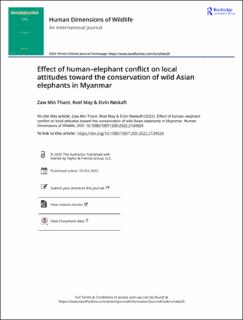Effect of human–elephant conflict on local attitudes toward the conservation of wild Asian elephants in Myanmar
Peer reviewed, Journal article
Published version

View/
Date
2022Metadata
Show full item recordCollections
- Publikasjoner fra CRIStin - NINA [2364]
- Scientific publications [1392]
Original version
10.1080/10871209.2022.2134524Abstract
The study of attitudes toward wild elephants and human–elephant conflict (HEC) is vital to understanding what attitudes are held by local people and how to incorporate them into wild elephant conservation. This study investigated the interlinkages between the HEC experience and local people’s attitudes toward the conservation of wild elephants and which exploratory factors influence these attitudes. We used a Bayesian Belief Network (BBN) framework to highlight the interlinkages between HEC and people’s attitudes. The basic BBN model indicated that HEC was central in determining the attitudes of local people. Although people generally hold positive attitudes toward elephants, people support having elephants in the country but not in their own regions. Conservation willingness was not obvious due to the lack of deliberate assistance from the government to the affected communities. We suggest implementing education programs to promote local awareness of conflict mitigation techniques. Bayesian belief network(BBN); conservation; elephas maximus; human–elephant conflict (HEC); wildlife
